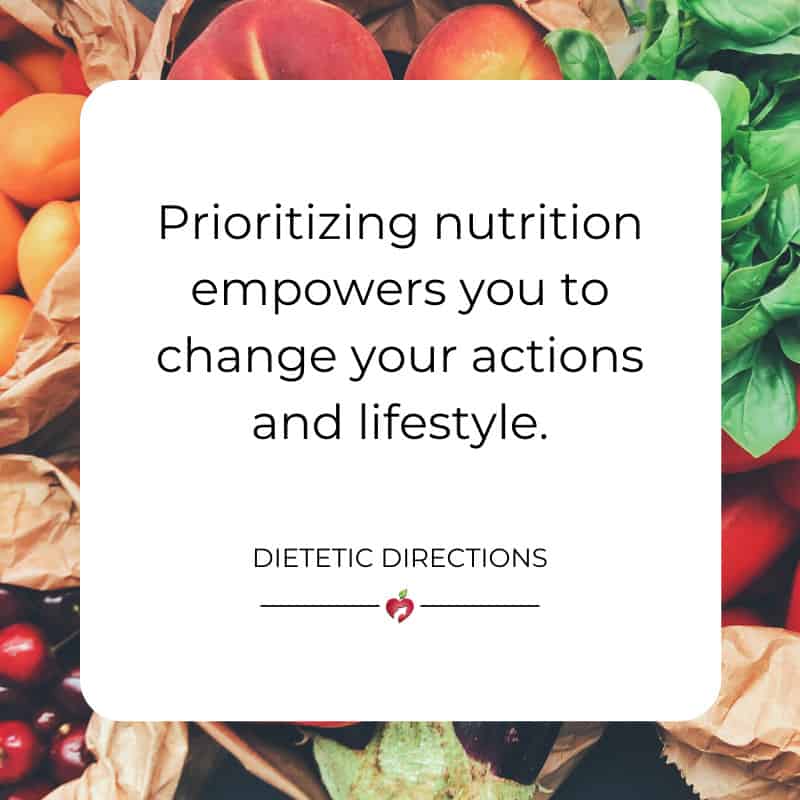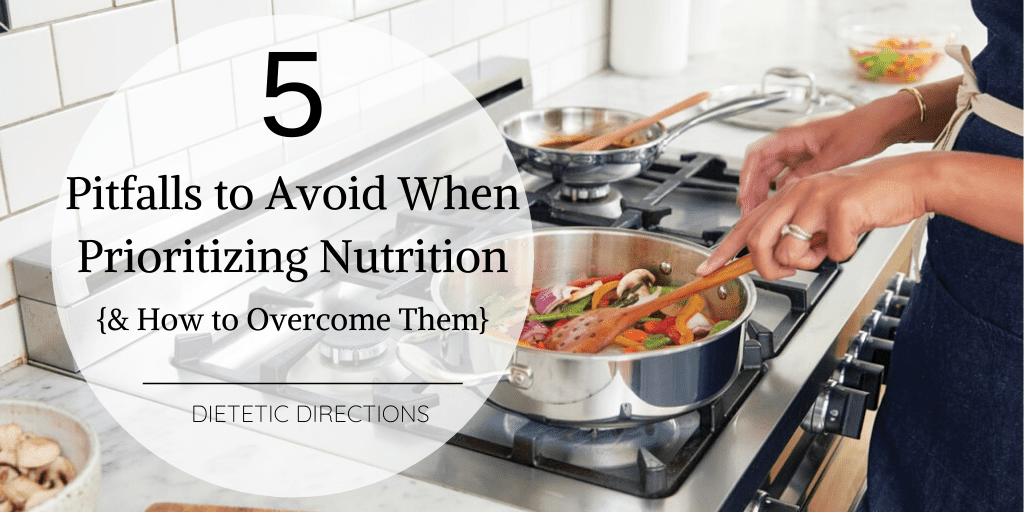
5 Pitfalls to Avoid When Prioritizing Nutrition
Is nutrition a priority? Really ponder this. Be honest. After all, prioritizing nutrition can make the difference in lifestyle habits, sticking or falling to the sidelines. Do you notice yourself saying, “If I have the time,” or do you say, “I’ll make the time,” when it comes to planning foods or putting in the necessary healthy eating effort?

We get it. People are increasingly busy and have countless commitments. Making nutrition a priority can be challenging (or darn near impossible). Nevertheless, every year, countless individuals come into our practice (click here to schedule with us), wanting support to better prioritize nutrition. This is no fad diet, but it is a lifestyle change – or possibly a lifestyle overhaul. They may be seeking a priority shift after experiencing health problems or feeling lackluster for far too long. They have started to question if the foods they are eating -or foods they are not eating – might be to blame. Prioritizing nutrition is a powerful strategy since our priorities dictate how we spend our time and how we feel in terms of our health and even our happiness.
“Our priorities dictate how we spend our time, how we feel and our happiness”
Today’s blog will reveal the Top 5 Pitfalls to Prioritizing Nutrition and how to overcome them. This topic is especially helpful at the end of the year as we reflect and gear up for the New Year. I will provide suggestions for how to overcome each prioritizing nutrition pitfall.
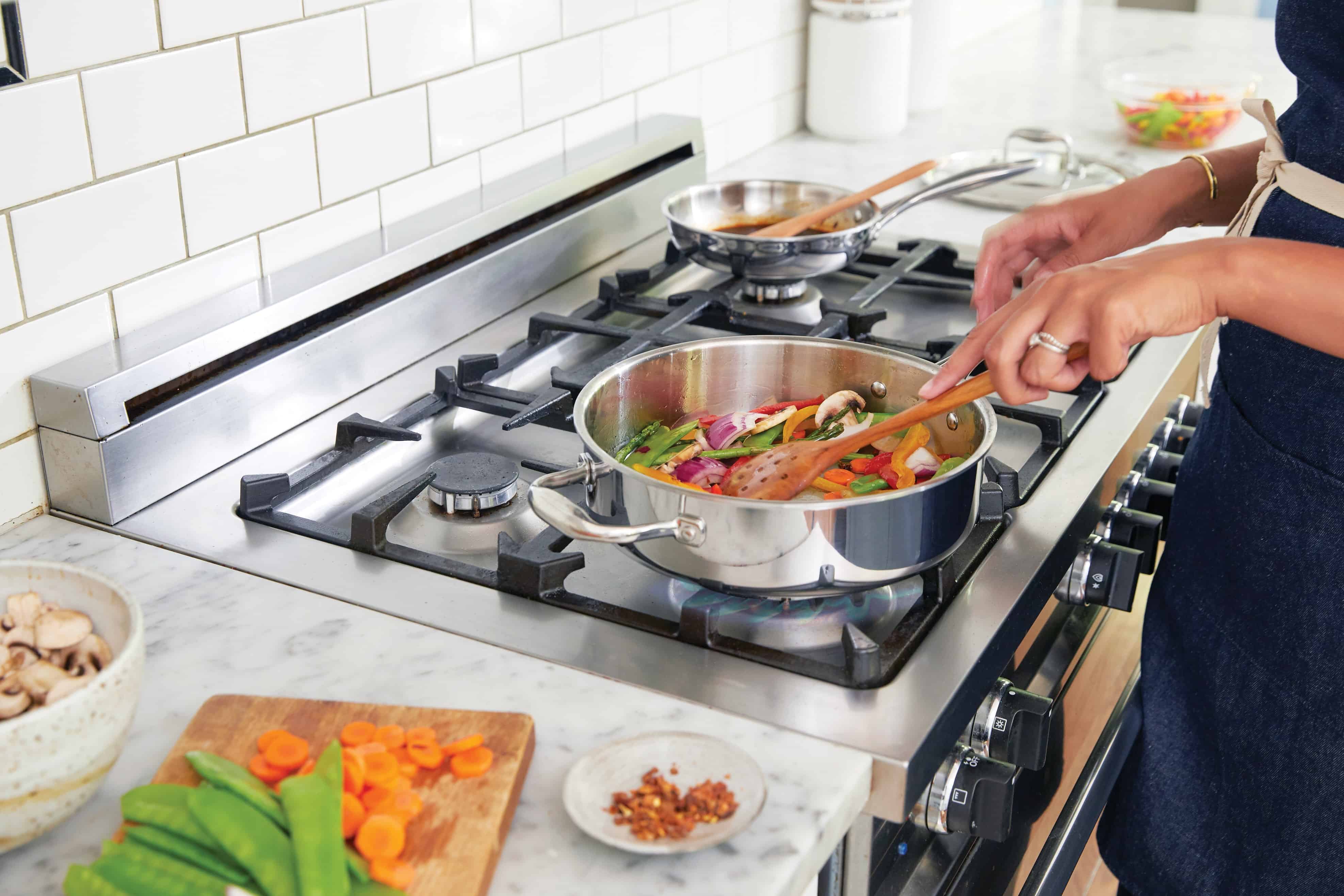
5 Pitfalls to Prioritizing Nutrition
1. Often Skip Meals or Delay Eating
Do you find yourself skipping/delaying meals, engaging in distracted eating while driving/working, or rushing to find something to eat when you’re already famished? If so, these actions dictate that you aren’t prioritizing nutrition. As a result, eating is treated as an after thought or burden, one we don’t want to think about (until it’s too late and we’re making less than ideal choices.) Our actions show that we don’t prioritize nutrition or eating for fuel.
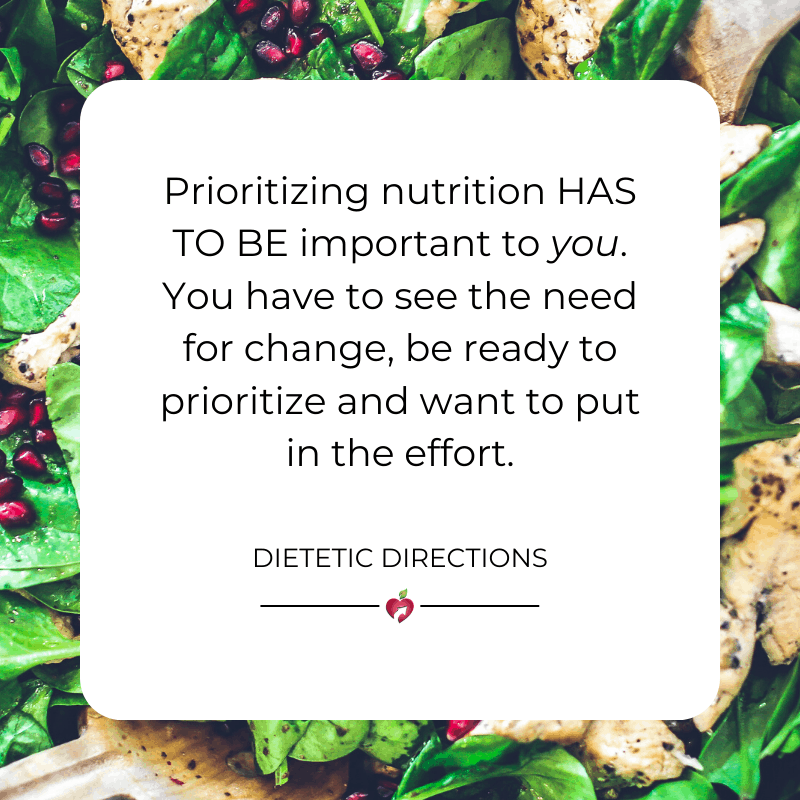
I know the above statement is blunt. However, we place action (time/thought/effort) on items we deem essential. Consequently, with an over-scheduled life, eating is often treated as necessary for survival but not a priority. We don’t put the time/thought or effort into it; instead, our actions reveal we consciously (or subconsciously) believe healthy eating isn’t that important or can somehow magically happen.

Why We Do It:
Primarily, we may have a hard time prioritizing nutrition because we are simply too busy and need to take things off our metaphorical plates. Additionally, many underestimate the importance of simply fueling our bodies! We assume our bodies can feast on our (fat) reserves, and it’s not a big deal to go long periods without eating or to miss a meal or two. WRONG! With this mentality, other things (work, errands, chores) will always be more important than nutrition. You may find yourself getting the kids ready for school or rushing to work/school and not noticing that you never ate! You won’t starve, right? But is it good for you or your metabolism? Nope.
Reality Check:
Skipping meals because we are “too busy” increases binge episodes, raises diabetes risk and leads to lower energy for physical activity.
First, we have to view nutrition as vitally important in order to prioritize it. Additionally, contrary to popular eating patterns, meal regularity (three meals daily, no more than six hours between) is crucial to a healthy diet and weight management. If you find yourself hungry between meals, then have a balanced snack like these. Going long periods without eating slows our metabolism, alters our hunger cues and can even boost fat storage to prevent starvation. Whereas meal regularity (prioritizing eating) helps your body burn calories efficiently/predictably and prevents cravings and overeating later in the day. In fact, skipping meals because we are “too busy” increases binge episodes, raises diabetes risk and leads to lower energy for physical activity. Similarly, eating while distracted/multi-tasking (in your car, while checking emails) makes people eat more and gain weight (American Journal of Clinical Nutrition).
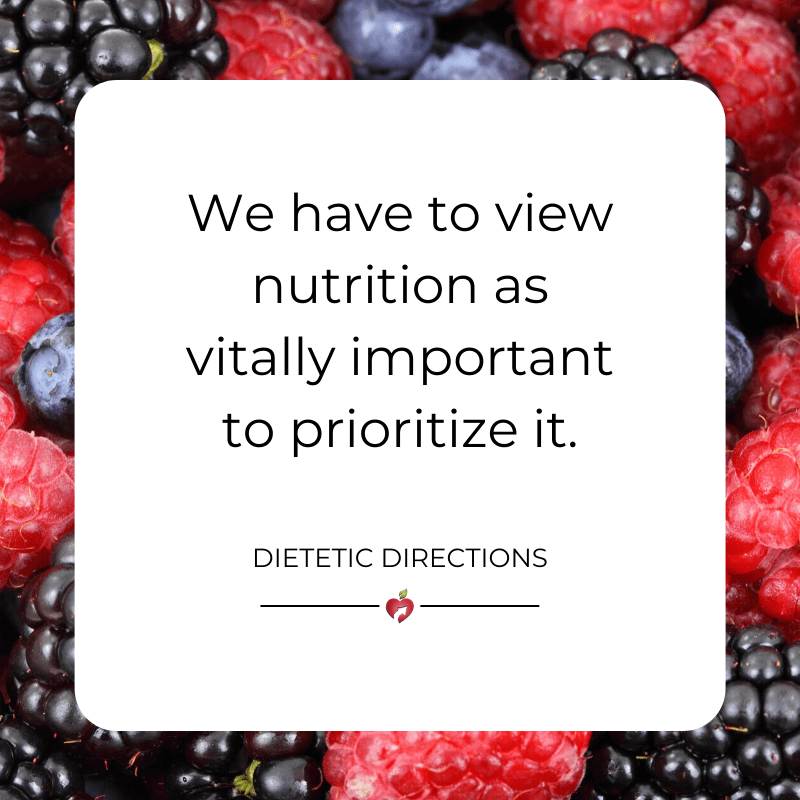
Solutions to Prioritize Nutrition:
If you find yourself skipping meals or waiting until you are famished to finally eat, acknowledge that you’re currently not prioritizing nutrition. For people who are used to this pattern, keep in mind that your body may not send hunger signals. This doesn’t mean you shouldn’t eat; it means you will have to set your own timer to cue you to eat. Similarly, if you habitually eat while distracted, acknowledge this. Perhaps you’re over-scheduled? No need to judge or be self-critical but it’s important to honestly notice eating patterns.

Next, if you are interested in prioritizing meal regularity, think of your body as a million-dollar racehorse. You invested in this horse to win races. Prioritizing nutrition means that eating is vital and that missing meals is not an option. Would you underfeed your racehorse and expect it to win? Why underfeed/nourish your body and expect it to perform optimally?

When we shift our mindset and priorities, new behaviours start happening. For example, that meeting scheduled over lunch becomes a healthy catered lunch or a walking meeting instead. Your rushed morning becomes a relaxing time to role-model prioritizing eating breakfast with your kids. With our priorities shifting, new behaviour changes can actually occur.
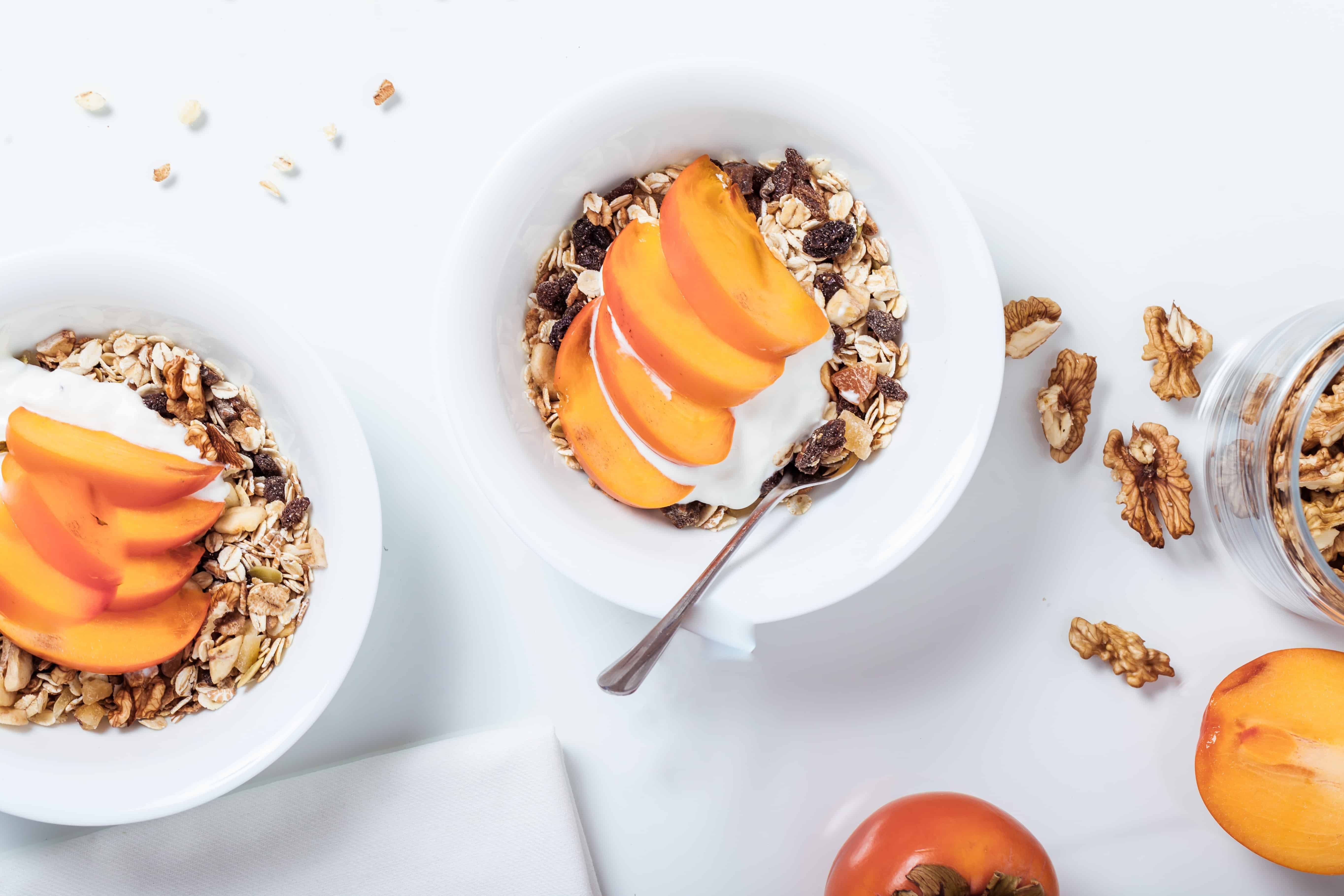
When we shift our mindset and priorities, new behaviours start happening. A meeting over lunch could become a walking meeting, or your rushed morning could become a relaxing time to role-model prioritizing eating breakfast with your kids.
2. We Avoid Cooking
If we avoid cooking (or don’t take the time to cook), then we can create a barrier to prioritizing nutrition. I get it – cooking can be a pain in the butt. It involves effort and varying amounts of time. You have to plan what you’re making, have the groceries available and then finally prepare the food. If that didn’t frustrate you, the icing on the cake is the clean-up! Who would choose this? Especially when you have a full-time job, a commute, screaming children, and apps like Skip the Dishes?

Why We Do It:
We may avoid cooking as a result of feeling overly burdened with stress and life obligations. Your body is telling you that it’s tired. Additionally, we may have unresolved childhood feelings about parents frustrated with cooking, and subconsciously, we hold this same feeling as well. We may also not have the food skills to cook or plan a meal. Nevertheless, if we find ourselves ordering in/eating out, buying convenience foods and rationalizing this behaviour, then we are avoiding cooking.
Discover the Top 5 Pitfalls to Prioritizing #Nutrition and how to solve them! #dietitian #eatwell #healthyeatingsolutions Share on XReality Check:
We all have the power to decide our priorities before someone else does it for us. If you find yourself overly reliant upon processed and convenience foods and want to cook more, see what you can remove from your schedule to make the space. Many do not know that cooking is one of the most powerful ways to improve one’s diet. This is because the food we get dining out is generally higher in calories, fat, salt and lower in vegetables and fibre. Similarly, if your goal is weight loss, it can be difficult to achieve this when we are at the mercy of restaurants making our food. For example, a red curry at Moxies can easily pack approximately 1,400 calories, not to mention an alcoholic beverage or two. One restaurant meal can easily surpass your daily calorie target.
We have the power to decide our priorities before someone else does it for you.
Solutions:
There’s hope for those who don’t enjoy cooking. You can make foods as simple as you choose. For our clients, we meet them where their skills are at and work from there. If you are able to make a simple grilled cheese or fried egg sandwich with veggie sticks, then more power to you! That’s a healthier and cheaper option than takeout.
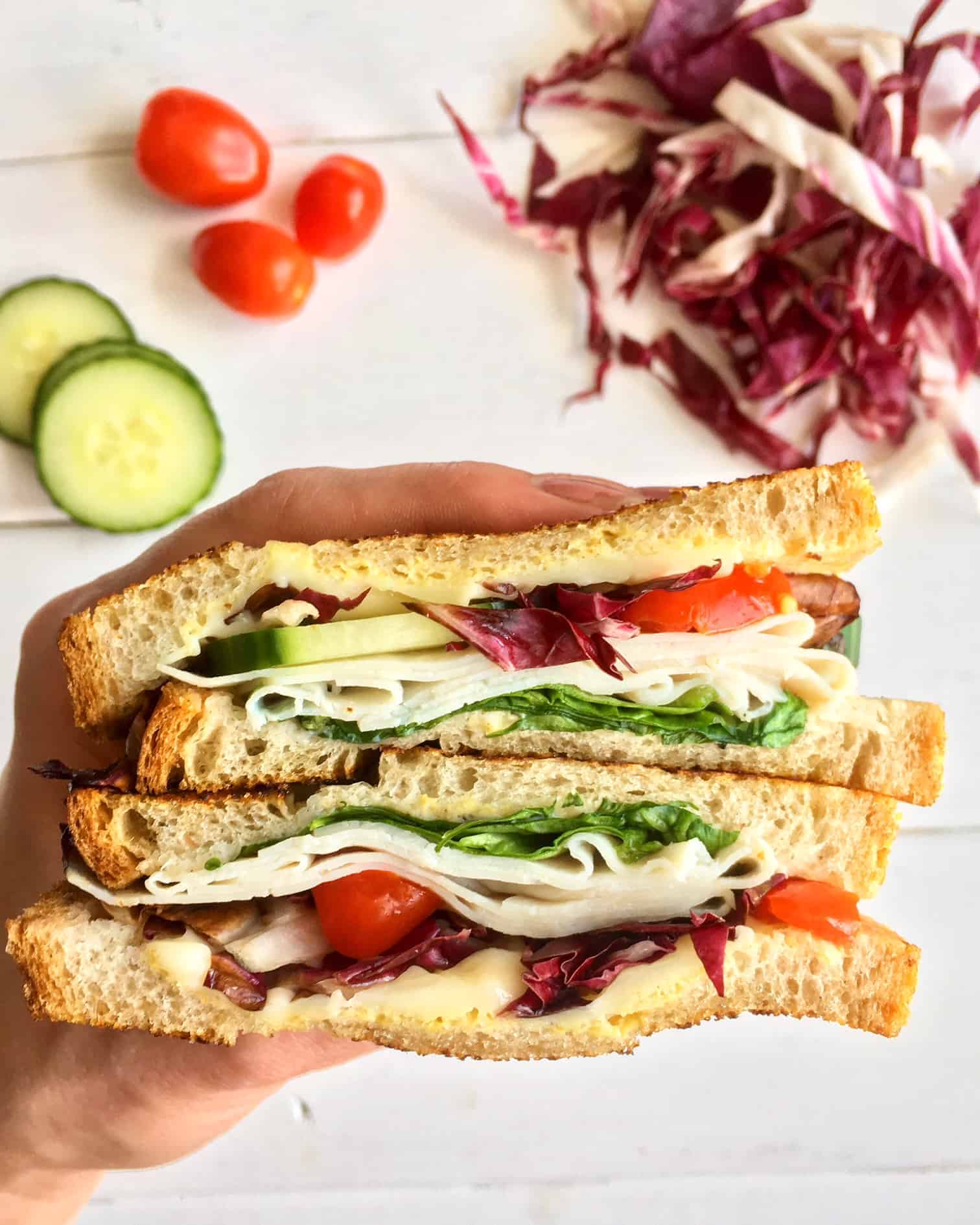
To begin, take a step back from being overwhelmed by cooking. Acknowledge your feelings towards the idea of cooking. This may sound silly, but it’s important for awareness. If you are willing, be introspective to see where this feeling might come from. Then, decide if you would like to cook more or come up with solutions like preparing foods on the weekend to freeze for busy nights. If you do want to cook more, I suggest lowering the burden by choosing options you really enjoy (I love naan pizzas for a tasty and fast meal). We can choose options made in minimal time with ingredients that we have on hand. A brainstorm list of fast favourites on the fridge is a great cue for meal ideas.
Next, be realistic about your schedule. When you make time to cook, how much time do you have? If you do not have time, use back-up options in the freezer, like leftovers that can simply be warmed. Here are some convenience foods that can be used in a pinch when you’re tight on time.
3. Stress Is High
High stress can be a major pitfall to prioritizing nutrition. Prolonged stress produces extra stress hormones (aka cortisol), which promotes weight gain around the midsection and puts the body into “fight or flight mode.” In a stress state, we act merely out of animalistic/survival instincts or do what we are most comfortable with (often not the ‘healthy choice’.)

Why We Do It:
When facing stress, our last response is to go to a “learned response” or shift our priorities to act differently. For example, feeling depleted in the evening may lead to emotional eating as a coping mechanism. However, if we take a step back from stress we can employ an alternate “learned response,” which could be to sit back and identify your physical stress symptoms in your body, noticing your jaw clenching, shallow breathing or negative internal dialogue. We then may be able to act compassionately to those feelings and take a bubble bath or talk to a friend as an alternative to emotional eating, which is used to avoid/distract from these uncomfortable feelings.

Reality Check:
We all face stress. When we are able to effectively lower our tension we can learn to act in new, perhaps more productive ways. This is one of the most powerful tools of life since stress can negatively affect our health and relationships. Contrary to popular belief, reducing stress also boosts your productivity because you will be focused and calm as opposed to tense and reactive. We can then take actions that best serve us – like prioritizing nutrition, if this is important to you.
DYK: Reducing stress boosts your productivity?
Solutions:
Take time daily to assess your stress level. Where’s the tension in your body? What are your related thoughts? Understand that tension will lead to automatic/survival responses. Seek ways to work through your stress/anxiety/depression/fear, possibly with a trained psychotherapist or professional counsellor. When stress is better managed, you will have more sustainability in your new habits (like prioritizing nutrition and wellness) and be less likely to retreat back to previous habits.

4. We Resist Planning
The fourth major pitfall of prioritizing nutrition is resistance to planning. There are many reasons why. However, in order to make nutrition a priority, you need to spend a little time planning and putting things in order to help your future self. Unless you have a personal chef, dietitian and assistant who does this for you. The reality is, healthy eating does not happen by accident and it certainly is not our default when busy. Lunches do not make themselves, dinner doesn’t usually get made by another, and groceries don’t often just end up at your door – although online grocery shopping can definitely help make this happen.
#Healthy eating does not happen by accident, and it is not our default when we are busy. Learn how to better prioritize your nutrition to improve your health! #dietitian #nutrition Share on XWhy We Do It:
Resisting planning goes back to all our previous prioritizing pitfalls. We may resist planning because we don’t prioritize eating; we simply resent cooking, or our stress remains too darn high. If we do not prioritize something, why plan for it? However, planning takes us to the next step in prioritizing nutrition. As Benjamin Franklin once said, “If you fail to plan, you are planning to fail.”
“If you fail to plan, you are planning to fail.”
Benjamin Franklin
Reality Check:
No time to prioritize meal preparation or grocery shopping causes more stress and makes healthy eating increasingly inconvenient. Without a system in place, eating well becomes an uphill climb. Ask yourself: Are your actions setting you up for success?
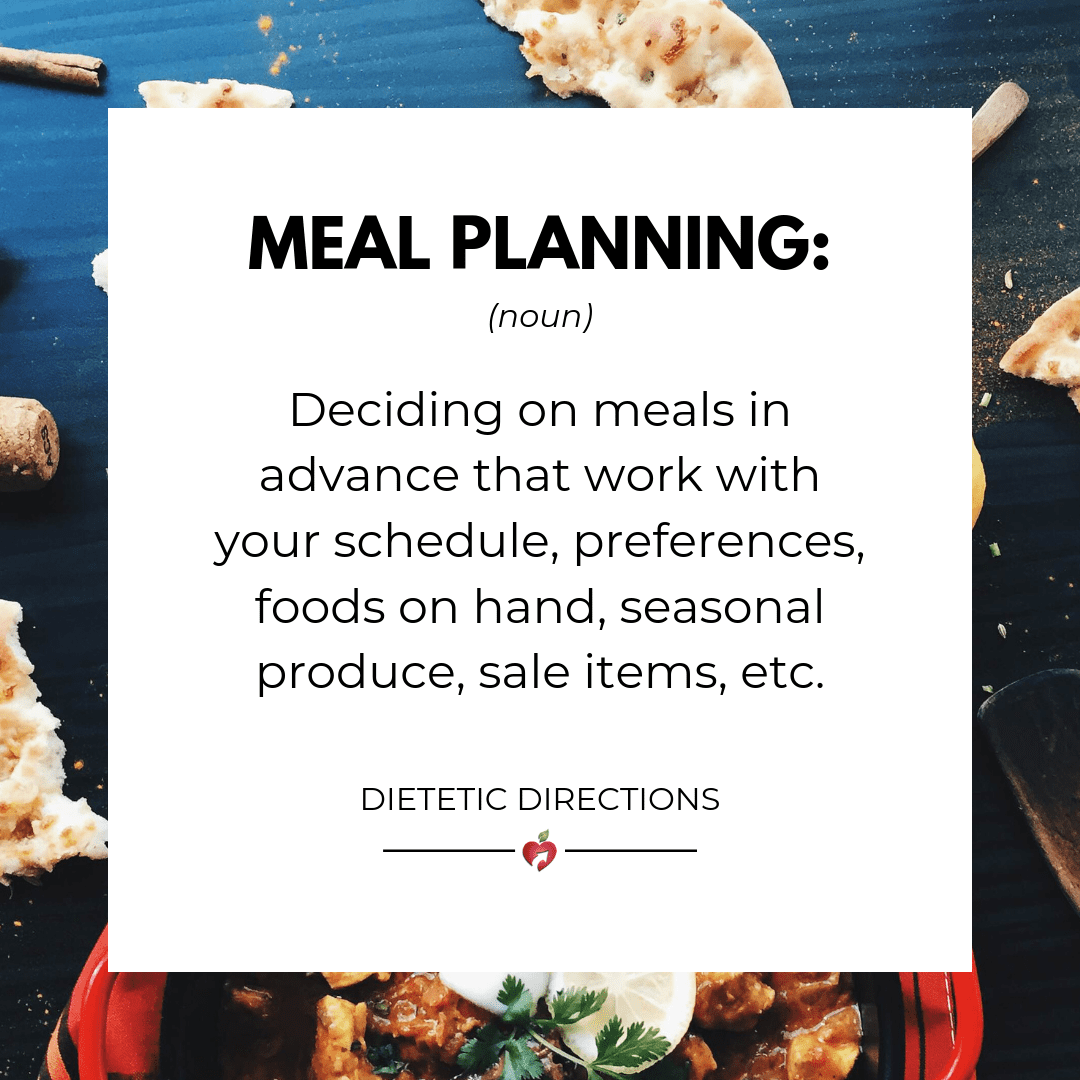
Solutions:
Take time on a Sunday (or another day of the week) to look at the week ahead and plan a few simple meals you and the family enjoy. Plan options that could fit around after-work or after-school obligations. What do we need to make these meals? Do we have the time necessary? Do we have meals to reheat in the freezer? Do we need to ask for help? These questions help with prioritizing planning to improve your nutrition.
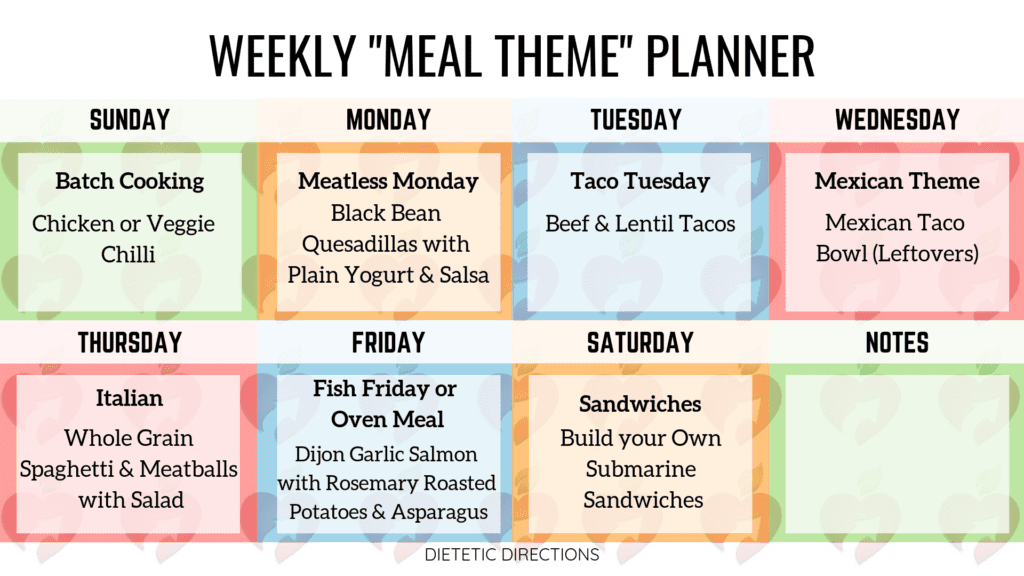
5. Perfection Paralysis
Lastly, when it comes to diet and lifestyle changes, many have tried in the past and do not want to fail in their new attempts. This makes them feel like unless they are “perfect” in their efforts, they might as well not try. This is also known as “All or Nothing Mentality” – you can read more about how it leads to diet sabotage here.
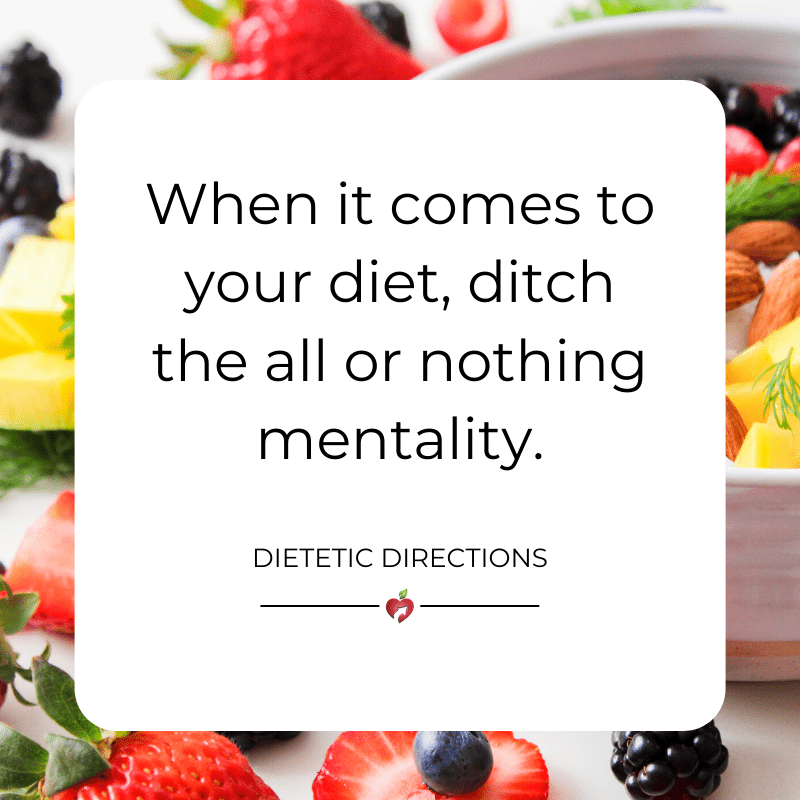
Why We Do It:
Many have perfection paralysis when setting standards unrealistically high, which actually sets us up for failure. Nobody can be perfect. Instead, notice the tendency to desire perfection; you could even trace where this desire comes from in your childhood with a psychotherapist. Engrained perfectionist tendencies can sabotage progress that doesn’t look “perfect”. Brene Brown, PhD, TED Talk guru and Licensed Master Social Worker, describes perfectionism as “the path to depression, anxiety, addiction and life paralysis.”

Reality Check:
Getting started is the key to progress. Let’s all ditch the idea of perfection. One step at a time. Think about your lifestyle and dietary changes like climbing a ladder – one rung at a time to get to the top. You may need to silence your inner critic and notice the common desire to compare yourself to others.

Solutions:
Congratulate yourself and celebrate steps forward! It’s not easy to make lifestyle improvements. Catch that inner critic (we all have one) and silence it. Then, surround yourself with supportive people who encourage you. When we release the idea of being perfect, it becomes easier to prioritize nutrition for our health, not for anyone else.

Bottom Line:
Prioritizing nutrition is vital to change your actions and your lifestyle. First, you must decide if this is what you want. Is nutrition important enough to prioritize? What will prioritizing nutrition look like in your life? Remember, nobody can choose another person’s priorities for them. If you are having a hard time prioritizing nutrition, you may have fallen into one of the Top 5 Pitfalls for Prioritizing Nutrition. Perhaps you skip meals or delay eating, you may avoid cooking, you may be overly stressed, you may resist planning, or perhaps you may be trapped in perfection paralysis. Nevertheless, you’re not stuck in these pitfalls forever. There are numerous strategies to overcome these pitfalls and get into a better groove!

Now it’s your turn! What do you prioritize in your life? What actions in your life support these priorities? Finally, do you have a new priority you want to focus on in the coming year?
